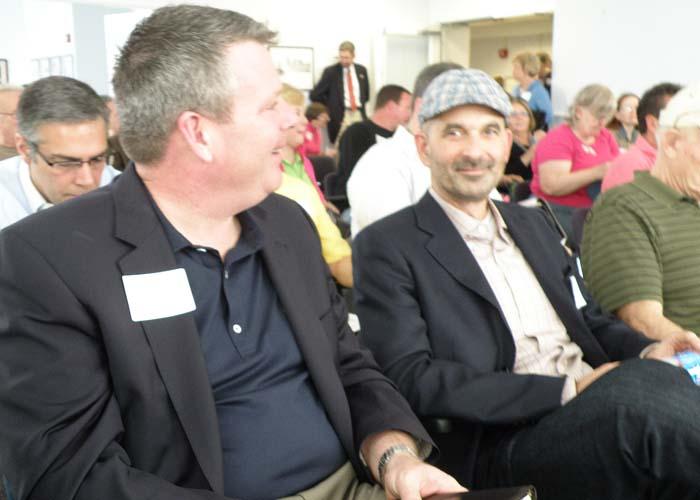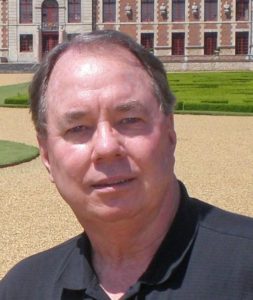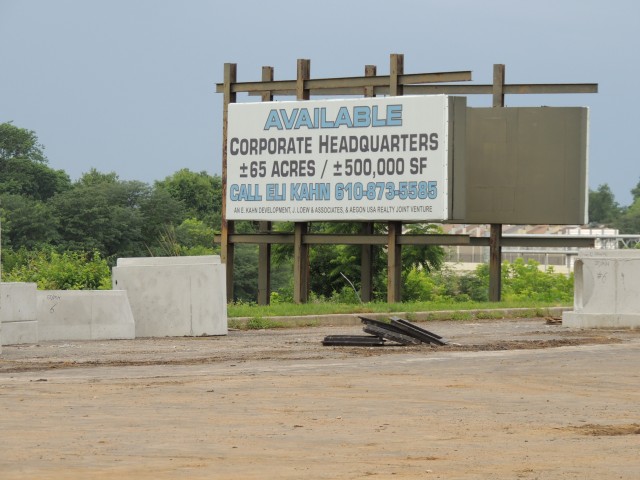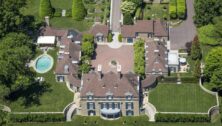Chester County Leadership: Eli Kahn

Eli Kahn’s name graces building lots, construction sites and finished commercial buildings across Chester County and Philadelphia’s western suburbs. Kahn, together with long time partner and mentor Jack Loew, who died suddenly last year, changed Chester County’s commercial real estate landscape forever.
 A few years out of college Kahn, with Loew’s help and guidance, purchased the 56 acre Sieko trailer manufacturing site on Route 10 in Eagle and then the vacant Pepperidge Farm building in Downingtown.
A few years out of college Kahn, with Loew’s help and guidance, purchased the 56 acre Sieko trailer manufacturing site on Route 10 in Eagle and then the vacant Pepperidge Farm building in Downingtown.
Currently, Kahn’s real estate development firm E. Kahn Development, is building Saint Gobain’s new corporate headquarters at the 401 and 202 exchange in East Whiteland Township and The Apartments at Chestnut Square, a 205 unit upscale apartment building in downtown West Chester.
VISTA Today asked Kahn about growing up in Allentown, playing baseball for West Chester University, how a lawn cutting business he started when he was twelve led to a real estate career, his 28 year relationship with Jack Loew and how a piece of advice from his father about following his dreams gave him the courage and foresight to persevere when he didn’t land his dream job right out of college.
VISTA Today: Did you grow up in Chester County Eli?
Eli Kahn: No, I was born in New York City but I don’t have many memories of living there. My father managed a manufacturing business and when I was six he took a transfer to Deere Lake, Pennsylvania north of Allentown. My high school years were at a time when Billy Joel’s “Allentown” song was so popular. The song rang true and resonated with me.
VT: What was your first job in high school?
EK: Way before high school, when I was about 12, I was cutting about a dozen lawns a week. My father bought me a used push mower a neighbor was selling. I told my dad that if he bought the mower for me I could cut lawns and make money. It was great money because I had no expenses other than a little gas.
VT: Did you have other kids working for you?
EK: No, it was just me. I was never a very good delegator or a good manager of people. Back then, I would rather work until dark and keep all the money I collected.
VT: Did you ever have an hourly job?
EK: No, I could never find an hourly job that paid as much as cutting grass did. In the winter, I plowed and shoveled driveways. I was outside, I was running my own thing, I had my shirt off; Life was good.
VT: You must have earned good money?

EK: I did! I used to put the money I earned cutting grass in my bottom dresser drawer in my bedroom. One day my dad came into my room when I was counting all these stacks of $5’s, $10’s and $20’s bills, what must have been around $1,200. He asks, “where did you get that?” He insisted I open a savings account.
I understood the money in the drawer, but I didn’t understand the concept of giving my money to a lady behind the counter and getting a passbook savings account.
VT: What lessons did you take from that experience that stays with you today?
EK: The big lesson I learned from mowing lawns was, just knock. It only took a little courage to knock on a door and ask a homeowner if I could cut their grass. I went to every house in the neighborhood. Sure, 80 percent of the people said no, but the rest said yes. That’s not a bad outcome.
I still knock on doors today. I’ve knocked on doors my entire career and if I had to boil down the success I’ve had in life to one thing it would be I’m not afraid to knock on a door.
VT: What did you do after high school?
EK: I was a pretty good pitcher in high school. One day, Dr. Neil Serpico, West Chester’s head baseball coach at the time came to one of my games. After the game, Coach Serpico introduced himself and invited me to visit West Chester. I looked at my dad, who happened to be at my game that day and asked, ‘where’s West Chester?’
I went down to West Chester for a visit and fell in love with the place. I decided West Chester was where I wanted to go to school.
VT: Did you look at any other schools?
EK: I looked at West Virginia, Temple and Drexel, but I liked West Chester’s campus.
VT: How good of pitcher were you?
EK: I was OK. I had two good years in college and then I lost interest in it. Baseball required a huge time commitment, and I just wanted to get on with my life.
VT: How did you get into real estate after college?
EK: In 1985, my junior year in college, I bought a house in West Chester that I lived in with 12 other guys. That is when the real estate light bulb went on for me. I liked the tangibility of real estate, the painting and fixing up, as well as the rent collection.
When I graduated from West Chester in 1986, I already owned a couple of properties and thought I’ll just find a job with a local real estate firm and learn the business from the ground up. I met with Jack Loew, Bernie Hankin, Tony Hayden, and Frank Cullen, but couldn’t get a job at one of the big brokerage companies. So I went to work for Bud Hanson. I stayed with Bud for a year before joining a commercial brokerage. I didn’t like the brokerage business all that much. Being a broker was too much like being a matchmaker. I knew I wanted to be on one side of the table or another.

In the Fall of 1990 Jack Loew called me out of the blue. I had done some business with Jack’s firm as a broker, so I knew how he did business. Jack offered me a job and agreed to teach me the construction, finance and property management side of the real estate development business. He agreed, and I went to work for Jack as an employee.
Three years later in 1992, Jack and I structured a partnership and together bought the 250,000 sq. ft. Sieko Trailer manufacturing plant on 56 acres in Eagle. Shortly after that in 1993 we bought the Pepperidge Farm plant in Downingtown.
VT: How did the partnership with Jack work out over the long term?
EK: Without putting anything in writing Jack did everything he said he would do. I filled up his buildings, took care of all the marketing of his properties. In return, he gave me the opportunity to get into the real estate development business as his partner. We remained partners and dear friends for 28 years until his sudden passing last January.
VT: Was Jack a tough boss?
EK: Never. I only saw Jack get angry and raise his voice one time when somebody tried to retrade a deal. Jack was in a difficult financial position at the time and had a lot of chips on the line. It was the only time he ever got mad.
 I learned so much just watching Jack. I was the hotheaded kid, ready to jump over the table. Jack on the other hand always remained calm no matter what happened. Through some horrible recessions he never missed a mortgage payment, never defaulted on a loan or gave a building back to the lender.
I learned so much just watching Jack. I was the hotheaded kid, ready to jump over the table. Jack on the other hand always remained calm no matter what happened. Through some horrible recessions he never missed a mortgage payment, never defaulted on a loan or gave a building back to the lender.
During the downturn of the early 90’s a lot of his consultants were telling him, ‘Jack, just give the building back to the bank.’ I remember Jack saying, ‘if I give this back to the bank and just walk away, I’ll never get another loan the rest of my life. If I can tough it out and make another payment, the banks will always respect that.’
VT: You said Jack Loew had the biggest impact on you professionally. Who had the biggest impact on your personally?
EK: I would say, my father. Without really liking what he did, my father worked for 40 years in the manufacturing business. He would drag himself home after work, and over dinner, tell my two brothers and me, ‘I don’t care what you are and what you do with your lives, as long as you find happiness and joy in your careers. I don’t care whether you are a garbage man or you want to play the violin or you want to grow mushrooms on the top of a mountain.’ He would tell us, ‘if you want to be garbage man, be the best garbage man in the world.’
He also admonished us to be an expert in something, that if we were an expert in something we would always find satisfaction in what we did.
VT: What challenges and or opportunities do you see in the immediate future?
EK: Its hard to say what my greatest challenge professionally is. Come on, we live in Chester County, and I’m a real estate developer. If you can’t do well in the real estate development business in this county over the last 30 years, you should be in a different business!
Personally, the biggest challenge for me is to manage my business when I don’t have Jack in my life anymore.
One of the things that made Jack and I such incredible partners was I handled the outside and Jack handled the inside. What I mean by that is I was on the street finding tenants and properties to buy while Jack handled all the construction loans, contracts and property management. We were each expert on our own side of the business. As a result, the business was on cruise control for 20 years.
After his death, I took most of 2014 to catch my breath. 2015 is the first full year without Jack. I’m refocused, as are the people on my team. But working without Jack is still a challenge. I often look at the picture of Jack hanging in my office and ask, what would Jack do in this situation.
VT: Finally Eli, What is the best piece of advice anyone ever gave you?
EK, I would have to say it was what my father said about following your dreams, falling in love with something and making a career at it. That advice gave me the freedom to explore options and find my own path in the real estate industry.
I love what I do. I fall asleep at night and wake up in the morning thinking about my job. Even when I’m out with my family, I’m looking at buildings. It’s who I am! It’s not about the money. I just love the new people and businesses you encounter every day. The real estate development business is so exciting.
Connect With Your Community
Subscribe to stay informed!
"*" indicates required fields






































![95000-1023_ACJ_BannerAd[1]](https://vista.today/wp-content/uploads/2023/03/95000-1023_ACJ_BannerAd1.jpg)









